小学英语总复习资料(语法)
小学英语语法大全(完整版)(可打印)
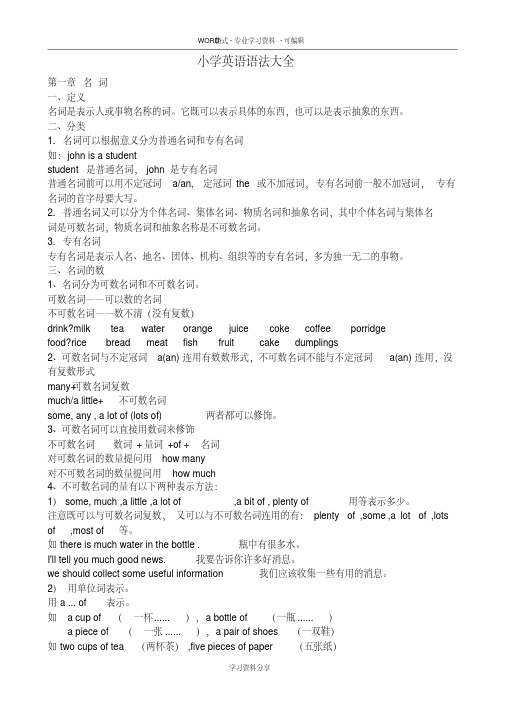
小学英语语法大全第一章名词一、定义名词是表示人或事物名称的词。
它既可以表示具体的东西,也可以是表示抽象的东西。
二、分类1. 名词可以根据意义分为普通名词和专有名词如:john is a studentstudent是普通名词,john是专有名词普通名词前可以用不定冠词a/an, 定冠词the 或不加冠词,专有名词前一般不加冠词,专有名词的首字母要大写。
2. 普通名词又可以分为个体名词、集体名词、物质名词和抽象名词,其中个体名词与集体名词是可数名词,物质名词和抽象名称是不可数名词。
3. 专有名词专有名词是表示人名、地名、团体、机构、组织等的专有名词,多为独一无二的事物。
三、名词的数1、名词分为可数名词和不可数名词。
可数名词——可以数的名词不可数名词——数不清(没有复数)drink?milk tea water orange juice coke coffee porridgefood?rice bread meat fish fruit cake dumplings2、可数名词与不定冠词a(an)连用有数数形式,不可数名词不能与不定冠词a(an)连用,没有复数形式many+可数名词复数much/a little+不可数名词some, any , a lot of (lots of) 两者都可以修饰。
3、可数名词可以直接用数词来修饰不可数名词数词 +量词 +of + 名词对可数名词的数量提问用how many对不可数名词的数量提问用 how much4、不可数名词的量有以下两种表示方法:1) some, much ,a little ,a lot of ,a bit of , plenty of 用等表示多少。
注意既可以与可数名词复数,又可以与不可数名词连用的有:plenty of ,some ,a lot of ,lots of ,most of 等。
如there is much water in the bottle .瓶中有很多水。
小学英语语法大全打印版
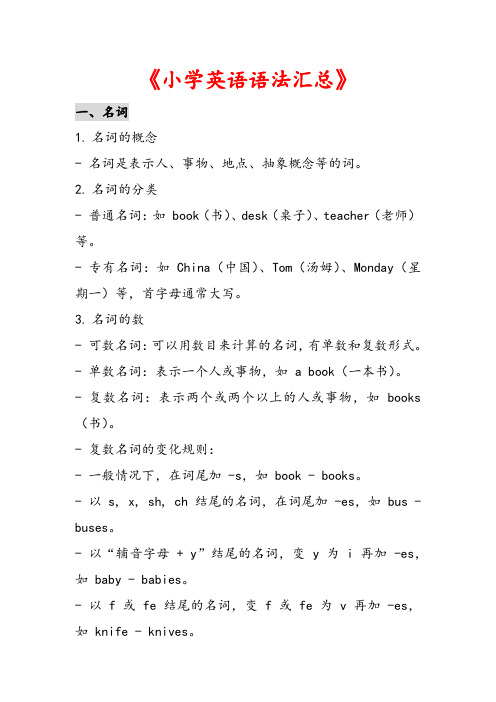
《小学英语语法汇总》一、名词1.名词的概念- 名词是表示人、事物、地点、抽象概念等的词。
2.名词的分类- 普通名词:如 book(书)、desk(桌子)、teacher(老师)等。
- 专有名词:如 China(中国)、Tom(汤姆)、Monday(星期一)等,首字母通常大写。
3.名词的数- 可数名词:可以用数目来计算的名词,有单数和复数形式。
- 单数名词:表示一个人或事物,如 a book(一本书)。
- 复数名词:表示两个或两个以上的人或事物,如 books (书)。
- 复数名词的变化规则:- 一般情况下,在词尾加 -s,如 book - books。
- 以 s, x, sh, ch 结尾的名词,在词尾加 -es,如 bus - buses。
- 以“辅音字母 + y”结尾的名词,变 y 为 i 再加 -es,如 baby - babies。
- 以 f 或 fe 结尾的名词,变 f 或 fe 为 v 再加 -es,如 knife - knives。
- 不可数名词:不能用数目来计算的名词,如 water(水)、milk(牛奶)、rice(米饭)等。
不可数名词没有复数形式。
4.名词的所有格- 表示所属关系,有两种形式:- ’s 所有格:一般用于有生命的名词后,如 Tom’s book (汤姆的书)。
- of 所有格:一般用于无生命的名词后,如 the door of the classroom(教室的门)。
二、代词1.代词的概念- 代词是用来代替名词或名词短语的词。
2.代词的分类- 人称代词:表示“我”“你”“他”“她”“它”“我们”“你们”“他们”等的词。
- 主格:I(我)、you(你;你们)、he(他)、she(她)、it(它)、we(我们)、they(他们),在句子中作主语。
- 宾格:me(我)、you(你;你们)、him(他)、her(她)、it(它)、us(我们)、them(他们),在句子中作宾语。
小学英语语法总复习 各语法点汇总 1

4. 当of短语中的名词被另一个短语或从句修饰时:
Can’t you look at the book of the boy behind you?
不定冠词a,an
只能用于单数可数名词之前
冠
词
单数可数名词
定冠词the
复数可数名词
2. zoo _zo_o_s______
3. glass _g_l_as_s_e_s___
4. fox _fo_x_e_s___
5. lady __la_d_ie_s____
6. policewomanp_o_li_c_ew_o_m__en_
7. house _h_ou_s_e_s______ 8. photo _p_h_ot_o_s____
以-s结尾的下复列数情人况称一名般词用末尾“加of’”结构:
girls-girls’
以-s结尾的1一. 些东人西名(没末有尾现加成’的s复合名词时J)a:mtehse-Jbaomokeso’f sthe film
2. 东西的一部分: the bottom of the box
3. 抽象的概念: the price of success
9. monkey _m_o_n_ke_y_s____ 10. wife _w_i_ve_s______
11. rose _r_o_s_e_s _______ 12. path _p_a_th_s______
13. judge _ju_d_g_e_s______ 14. map _m_a_p_s_______
please take these books to __h_im_____(他). 8. __T_h_e_y___(他们) found __it_____(它) difficult to learn German.
完整版小学英语语法大全 .doc
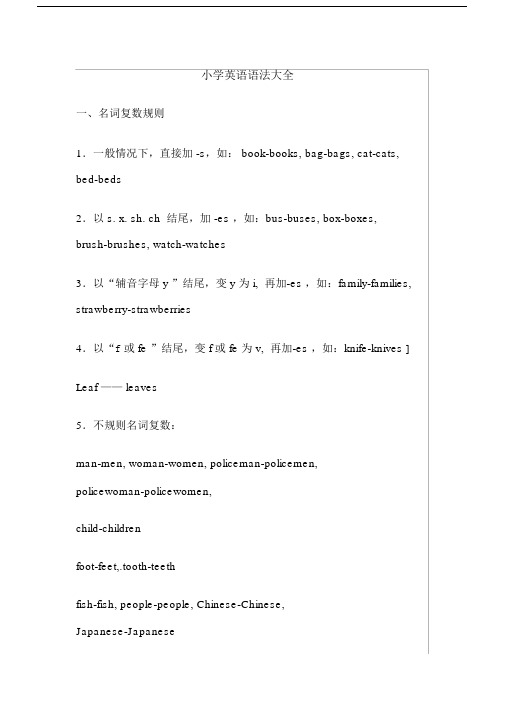
小学英语语法大全一、名词复数规则1.一般情况下,直接加 -s,如: book-books, bag-bags, cat-cats, bed-beds2.以 s. x. sh. ch 结尾,加 -es ,如:bus-buses, box-boxes,brush-brushes, watch-watches3.以“辅音字母 y ”结尾,变 y 为 i, 再加-es ,如:family-families, strawberry-strawberries4.以“f或 fe ”结尾,变 f 或 fe 为 v, 再加-es ,如:knife-knives ] Leaf —— leaves5.不规则名词复数:man-men, woman-women, policeman-policemen,policewoman-policewomen,child-childrenfoot-feet,.tooth-teethfish-fish, people-people, Chinese-Chinese,Japanese-Japanese写出下列各词的复数I _________him _________this ___________her ______watch _______child _______photo ________diary ______day________ foot________ book_______ dress ________tooth_______ sheep ______box_______ strawberry _____peach______ sandwich ______dish_______bus_______man______ woman_______二、一般现在时一般现在时基本用法介绍【No. 1 】一般现在时的功能1.表示事物或人物的特征、状态。
如:The sky is blue. 天空是蓝色的。
小学英语语法总复习完整版
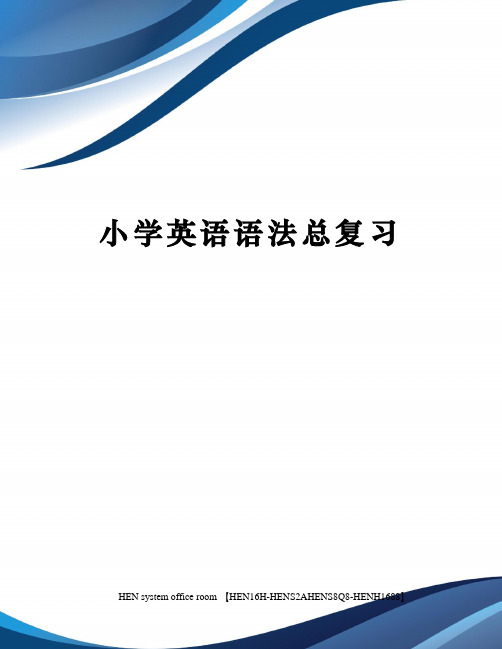
小学英语语法总复习 HEN system office room 【HEN16H-HENS2AHENS8Q8-HENH1688】小学英语语法总复习一、时态1.一般现在时(1)表示经常发生的动作或事情,通常用“usually通常, often常常, every…每…, sometimes有时,always总是,”等词。
(1)表示正在发生的动作,通常用“now现在, look看,linsen听”.(2)基本形式: be + 动词ingeg: I am(not) doing my homework.You/We/They are(not) reading.He/She/It is(not) eating.What are you doingIs he reading?(1)表示过去已经发生的事情,通常用“last …上一个…, just now刚才, a moment ago刚才, yesterday昨天”等词。
(2) be 动词的过去式: am/is—was are—were原形过去式原形过去式原形过去式原形过去式sweep swept teach taught have had go went keep kept think thought do did find found sleep slept buy bought eat ate say said feel felt drink drank is/am was take took read read give gave are were mean meant put put sing sang drive drove meet met cut cut begin began speak spoke make made let let ring rang write wrote see sawfly flew run ran ride rode come came draw drew sit sat hear heard tell toldgrow grew learn learned/learntget got know knew4.一般将来时一般将来时表示将来打算做的事或将要发生的事情。
小学英语语法大全(考试必备)

Contents第一章名词1.名词的数2.名词的格第二章代词1.人称代词2.物主代词第三章冠词与数词1.冠词2.数词第四章一般现在时态第五章现在进行时态第六章句型1.陈述句2.疑问句3.祈使句4.There be 句型与have\ has第七章总结考试第一章名词(Noun)名词的概念在生活中,我们会接触到各种各样的人和事物,用来表示这些人或事物名称的词就是名词。
一、名词的数名词的数指名词的单数和复数形式。
可数名词表示“一个”时用单数,“两个以上”时用复数;不可数名词表示量时,通常用“数词+单位+of+物质名词”的形式,如 a piece of bread (一片面包),变为复数时,只须将单位名词变为复数,如:two pieces of bread(两片面包)。
*名词复数的构成法则1. 一般情况下在词尾加s. 词尾读音shop --- shops (商店) 在清辅音后读[ s ]bag --- bags (书包) 在浊辅音后读[ z ]window --- windows (窗户) 在元音后读[ z ]2. 以s, x, sh, ch 结尾的单词在词尾加es。
class --- classes (班级) 词尾读音[ iz ]box --- boxes (盒子)match --- matches (比赛)brush --- brushes (刷子)3. 以“辅音字母+y” 结尾的词,变y为i 加es.story --- stories (故事) 词尾读音[ iz ]4. 以“元音字母+y” 结尾的词,在词尾直接加skey --- keys 词尾读音[ z ]monkey --- monkeys5.以“o” 结尾的名词,复数一般在词尾加“s”, 但个别加“es”tomato --- tomatoes (西红柿) 词尾读音[ z ]potato --- potatoes (土豆)zoo --- zoos (动物园)photo --- photos (照片)*(以“o”结尾,复数加“es”)口诀:黑人(Negro)英雄(hero),左手拿着西红柿(tomato),右手拿着破土豆(potato),头顶一个大芒果(mango)。
小学英语语法全套(课堂PPT)
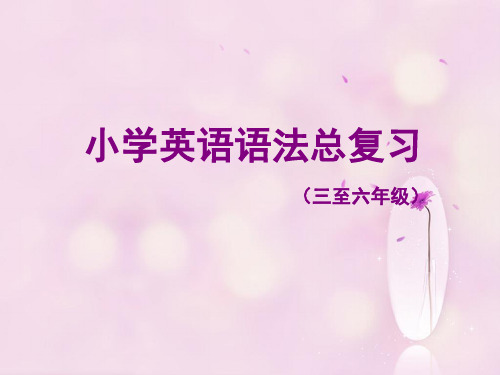
strawberry _____
thief _____
you _____ peach___ sandwich ___
man_____ woman___
一般现在时
一般现在时基本用法介绍 一般现在时的功能 1.表示事物或人物的特征、状态。
如:The sky is blue.天空是蓝色的。 2.表示经常性或习惯性的动作。
如:I get up at six every day.我天天六 点起床。 3.表示客观现实。 如:The earth goes around the sun.地 球绕着太阳转。
一般现在时的构成 1. be动词:主语 be (am, is, are) 其它。 如:
I am a boy.我是一个男孩。
2.行为动词:主语 行为动词( 其它)。如: We study English.我们学习英语。 当主语为第三人称单数(he, she, it)时,
要在动词 后加“-s”或“-es” 如:Mary likes Chinese.玛丽喜欢汉语。
一般现在时的变化 1. be动词的变化。 否定句:主语 be not 其它。
❖2. I do my homework every day.(改为一般疑 问句,作否定回答) ______________________________________
Class One. 3. We _______(not watch) TV on
Monday.
4. Nick _______(not go) to the zoo on Sunday. 5. _____ they ______(like) the World Cup?
6. _______ your parents ______(read) news papers every day?
小学英语总复习单词短语句型语法总汇

小学英语总复习重点单词、短语、句型、语法总汇第三册重点单词1.bag 包bed床beef 牛肉2.book 书boy 男孩bread 面包3.brother 兄弟chair 椅子chicken 鸡肉4.classroom教室desk 课桌doctor 医生5.friend 朋友girl 女孩home家k 牛奶mother妈妈pen 钢笔7.pencil铅笔pencil-case铅笔盒rice米饭8.room 房间ruler 尺子school 学校9.sister 姐妹student 学生teacher 教师10.water 水window 窗户nurse 护士11.fish 鱼第四册重点单词puter 计算机board 写字板fan 风扇2.light 灯this 这个is 是3.my 我的that 那个your 你的4.teacher’s des讲台picture 图画wall 墙壁5.floor 地板yes 是的it 它6.one 一two 二three 三7.four 四five五six六8.seven 七eight八nine 九9.ten 十what 什么time 时间10.it’s 它是o’clock…点钟math 数学11.Chinese 语文English 英语P.E. 体育12.music 音乐for 为;给class 课程13.red 红色的blue 蓝色的yellow 黄色的14.green 绿色的white 白色的no 不;不是15.not 不是的skirt 短裙shirt 衬衫16.jacket 夹克衫T-shirt T恤衫dress 连衣裙17.colour 颜色warm 暖和的cold 寒冷的18.cool 凉爽的today今天jeans 牛仔裤19.pants 长裤socks 袜子shoes 鞋子20.let’s 让我们play 玩;踢football 足球21.snowy下雪的sunny 晴朗的how much 多少钱22.big 大的small 小的long 长的23.short 短的apple 苹果banana 香蕉24.pear 梨orange 橙子watermelon 西瓜25.are 是(复数) they 它(他,她)们horse 马26.aren’t 不是(复数) cat 猫rabbit 兔子27.pig 猪duck 鸭子dog 狗28.eleven 十一twelve 十二thirteen 十三29.fifteen 十五twenty 二十how many多少30.there 那儿;那里第五册重点单词1.smart 聪明的old 年老的thin 瘦的2.funny 滑稽可笑的tall 高的active活跃的3.but 但是quiet 安静;文静的very 很;非常4. young 年轻的strong 强壮的kind和蔼亲切的5. Mr. 先生short 矮的like 像;喜欢6. strict严格的who’s=who is是谁what’s=what is是什么7. he’s=he is他是she’s=she is她是Monday星期一8. Tuesday 星期二Wednesday星期三Thursday星期四9. Friday 星期五Saturday星期六Sunday 星期天10. day 天;日子have 有;吃on在……时候11. too 太;也grape 葡萄don’t=do not不要12.fruit 水果salty咸的fresh 新鲜的13.favourite最喜爱的tasty 好吃的fish 鱼茄子14.sour 酸的we 我们lunch午饭;中餐15.tomato 西红柿potato 土豆tofu 豆腐16.green beans青豆they’re=they are 他(她;它)们是17.curtain窗帘trash bin 垃圾桶closet 衣橱18.mirror 镜子end table 床头柜bedroom卧室19.kitchen 厨房bathroom 卫生间living room 客厅20. in 在…里on 在…上under 在…下21. near在…附近behind 在…后面clothes 衣服22. river 河流flower 花grass 草23. lake 湖泊forest 森林path 小路24. park 公园house房子bridge 桥25. tree 树木road 路;公路building 建筑物26. clean 干净的eggplant 茄子sweet 甜的第五册重点短语1. English teacher2. math teacher英语老师数学老师3. Chinese teacher4. have an English class语文老师上一节英语课5. on Wednesdays6. do my homework在星期三做作业7.watch TV 8. read books看电视看书9. play computer games 10. my favourite玩计算机游戏我最爱的11. favourite fruit 12. sweep the floor最喜欢的水果扫地13. cook the meals 14. clean the room做饭清洁房间15. water the flowers 16. wash the clothes浇花洗衣服17. set the table 18. make the bed摆餐具铺床19. do the dishes 20. clean the bedroom洗碗碟清洁卧室21. use a computer 22. near the table用计算机桌子旁边23. under the bed 24. over the river床下河上方25. on the desk 26. behind the door书桌上门后面27. in the closet 28. a picture of my room衣橱里一张我房间的照片第六册重点单词1. Apr.四月at 在……点钟Aug. 八月2. because 因为best 最;极birthday 生日3. date日期Dec. 十二月evening夜晚;晚上4. fall 秋天Feb. 二月fly 飞5. grandpa爷爷;外公her 她的Jan. 一月6. July 七月June 六月May 五月7. Mar. 三月Mom 妈妈noon 中午8. Nov. 十一月Oct. 十月often 经常9. season 季节Sept. 九月skate 滑冰10. sleep 睡觉sometimes有时候spring 春天11. summer 夏天swim 游泳uncle 叔叔12. usually 通常;一般why 为什么weekend周末13. which 哪一个winter 冬天honey 蜂蜜14. study 书房jump 跳run 跑15. kangaroo 袋鼠climb 往上爬fight 打架16. swing 荡;荡秋千第六册重点短语1. do morning exercises2. eat breakfast晨练吃早饭3. eat dinner4. fly kites吃晚饭放风筝5. get up6. go hiking起床去远足7. climb mountains 8. climb trees爬山爬树9. go shopping 10. have English class购物上英语课11. make a snowman 12. plant trees堆雪人种树13. play sports 14. play the piano进行体育运动弹钢琴15. visit grandparents 16. draw pictures看望祖父母画画17. cook dinner 18. read a book做饭看书19. answer the phone 20. listen to music接电话听音乐21. clean the room 22. write a letter打扫房间写信23. write an e-mail 24. drink water写电子邮件喝水25. watch insects 26. take pictures观察昆虫照相27. pick up leaves 28. do an experiment采摘树叶做实验29. catch butterflies 30. count insects捉蝴蝶数昆虫31. collect leaves收集树叶32. write a report写报告33. play chess 下棋34. have a picnic举行野餐第七册重点单词1.by经;乘… foot脚bike 自行车2.bus 公共汽车train 火车how 怎样3.traffic交通stop停;停车站wait等;等待4.library 图书馆post office 邮局hospital 医院5.cinema 电影院bookstore 书店where 哪里6.please 请turn转弯right 右边7.left 左边straight 成直线地then然后ic book 漫画书post card 明信片newspaper报纸9.buy购买hobby爱好dive 跳水10.live 居住teach教go 去11.watch 观看read 读;看does 助动词12.doesn’t否定助动词singer 歌唱家writer作家13.actor 男演员actress 女演员artist 画家 reporter电视台记者engineer 工程师15.accountant 会计policeman 警察16.salesperson 销售员cleaner 清洁工17.work 工作rain 雨;下雨cloud 云;云彩18.sun 太阳stream 小溪;小河seed 种子19.soil 泥土sprout 苗;嫩芽plant 植物;种植20.should 应该then 然后第七册重点短语1.on foot 走路2. by train 坐火车3. by bus4. by bike坐公共汽车骑自行车5.by plane6. stop at a red right坐飞机红灯停7.wait at a yellow light 8. go at a green light黄灯等绿灯走9. traffic light 10. near the post office交通灯邮局附近11. next to the hospital 12. turn left医院隔壁(与医院相邻)转左13. turn right 14. go straight转右直走15. get on 16. get off上车下车17.take a trip 18. read a magazine去旅行看杂志19. go to the cinema 20 . this morning看电影今天早上21. this afternoon 22. this evening今天下午今天晚上23. next week 24. collect stamps下周集邮25. make kites 26. ride a bike制作风筝骑自行车27. play the violin 拉小提琴28. go to work 上班29. watch TV at night 30. read newspapers晚上看电视看报纸31. teach English 32. live in Beijing教英语住在北京33. come from 34. plant flower seeds来自种花种第八册重点单词:1.taller 更高的shorter 更矮的stronger 更强壮的2.older 年纪更大的younger更年轻的bigger更大的3.heavier 更重的longer更长的thinner更瘦的4.smaller 更小的hurt疼痛:受伤matter事情5.sore 疼的nose 鼻子tired 疲劳的6.excited 兴奋的angry 生气的happy高兴的7.bored 无聊的sad 伤心的last上一个;最后的8.weekend 周末to 向:朝park 公园9.Chinese 汉语;中国的good 好的present礼物10.boat 小船elephant大象how 怎样;多么11.watch-watched观看wash-washed洗12.clean-cleaned 打扫play-played玩13.visit-visited看望;拜访;参观do-did做14.go-went 去read-read 读:阅读15.learn-learned 学习dance- danced跳舞16.eat-ate吃take-took 照;拍17.climb-climbed 爬have-had 有18.buy-bought 买row-rowed 划19.see-saw看见leave-left 离开20.get-got 到达第八册重点短语1.taller t han…比……高2. have a fever 发烧2.have a cold 感冒 4. have a toothache 牙疼5. have a headache 头疼6. have a sore throat 喉咙疼7. watch TV 看电视8. wash clothes 洗衣服9. play football 踢足球10. visit grandparents 看望祖父母11. go to a park 去公园12. read a book 看书7. go swimming 去游泳8. go fishing 去钓鱼9. went hiking 去远足10. learn Chinese 学习汉语11. sing and dance 唱歌跳舞12.eat good food 吃美食1.take pictures 照相14. buy presents 买礼物2.row a boat 划船16. see elephant 看大象3.go skiing 去滑雪18. go ice-skating 去滑冰第四册重点句型1.This is my computer. 这是我的计算机。
小学英语语法总复习知识点归纳

小学英语语法总复习知识点归纳1.词汇与词组- 动词be的变形及使用(am, is, are)- 人称代词(I, you, he, she, it, we, they)-一般现在时的动词变形及使用- 常见形容词(happy, sad, big, small, etc.)- 常见副词(quickly, slowly, well, etc.)- 常见连词(and, but, or, so, because, etc.)- 常见介词(in, on, under, behind, etc.)-数字的表达方式及使用2.句子结构-主语和谓语的搭配-主谓一致- 物主代词(my, your, his, her, its, our, their)3.一般现在时-用于表示经常发生的动作或状态-用于表达客观事实-肯定句、否定句、疑问句的构成及变化4.一般过去时-表示过去发生的动作或状态-动词的过去式的构成规则-肯定句、否定句、疑问句的构成及变化5.现在进行时-表示现在正在进行的动作-现在进行时的构成规则-肯定句、否定句、疑问句的构成及变化6.简单将来时-表示将来发生的动作或状态-一般将来时的构成规则-肯定句、否定句、疑问句的构成及变化7.名词-可数名词和不可数名词的区分-可数名词的单数和复数形式-不可数名词的用法及特点8.代词-主格和宾格的使用-物主代词的用法及特点-反身代词的用法及特点9.形容词-形容词的用法及特点-形容词的比较级和最高级的构成规则-形容词的比较级和最高级的用法10.副词-副词的用法及特点-副词在句子中的位置-副词修饰动词、形容词和副词的用法11.冠词- 不定冠词a和an的使用- 定冠词the的使用-零冠词的使用12.介词-介词的用法及特点-介词短语的使用-介词与名词、代词、动词的搭配13.连词- 并列连词的使用(and, but, or)- 选择连词的使用(either...or, neither...nor)- 原因连词的使用(because, so, therefore)14.感叹句-感叹句的构成规则-感叹句中感叹词的使用-常见感叹句的用法15.注意事项-动词的时态和语态的正确使用-不同词性的词在句子中的位置-注意名词复数形式的规则。
小学英语总复习重点单词短语句型语法总汇
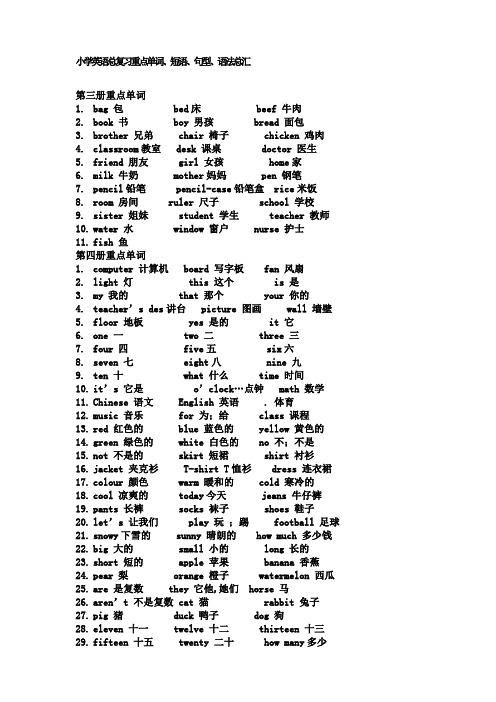
小学英语总复习重点单词、短语、句型、语法总汇第三册重点单词1.bag 包 bed床 beef 牛肉2.book 书 boy 男孩 bread 面包3.brother 兄弟 chair 椅子 chicken 鸡肉4.classroom教室 desk 课桌 doctor 医生5.friend 朋友 girl 女孩 home家k 牛奶 mother妈妈 pen 钢笔7.pencil铅笔 pencil-case铅笔盒 rice米饭8.room 房间 ruler 尺子 school 学校9.sister 姐妹 student 学生 teacher 教师10.water 水 window 窗户 nurse 护士11.fish 鱼第四册重点单词puter 计算机 board 写字板 fan 风扇2.light 灯 this 这个 is 是3.my 我的 that 那个 your 你的4.teacher’s des讲台 picture 图画 wall 墙壁5.floor 地板 yes 是的 it 它6.one 一 two 二 three 三7.four 四 five五 six六8.seven 七 eight八 nine 九9.ten 十 what 什么 time 时间10.it’s 它是o’clock…点钟 math 数学11.Chinese 语文 English 英语 . 体育12.music 音乐 for 为;给 class 课程13.red 红色的 blue 蓝色的 yellow 黄色的14.green 绿色的 white 白色的 no 不;不是15.not 不是的 skirt 短裙 shirt 衬衫16.jacket 夹克衫 T-shirt T恤衫 dress 连衣裙17.colour 颜色 warm 暖和的 cold 寒冷的18.cool 凉爽的 today今天 jeans 牛仔裤19.pants 长裤 socks 袜子 shoes 鞋子20.let’s 让我们 play 玩;踢 football 足球21.snowy下雪的 sunny 晴朗的 how much 多少钱22.big 大的 small 小的 long 长的23.short 短的 apple 苹果 banana 香蕉24.pear 梨 orange 橙子 watermelon 西瓜25.are 是复数 they 它他,她们 horse 马26.aren’t 不是复数 cat 猫 rabbit 兔子27.pig 猪 duck 鸭子 dog 狗28.eleven 十一 twelve 十二 thirteen 十三29.fifteen 十五 twenty 二十 how many多少30.there 那儿;那里第五册重点单词1.smart 聪明的 old 年老的 thin 瘦的2.funny 滑稽可笑的 tall 高的 active活跃的3.but 但是 quiet 安静;文静的very 很;非常4. young 年轻的 strong 强壮的 kind和蔼亲切的5. Mr. 先生 short 矮的 like 像;喜欢6. strict严格的who’s=who is是谁what’s=what is是什么7. he’s=he is他是she’s=she is她是 Monday星期一8. Tuesday 星期二 Wednesday星期三 Thursday星期四9. Friday 星期五 Saturday星期六 Sunday 星期天10. day 天;日子 have 有;吃 on在……时候11. too 太;也 grape 葡萄don’t=do not不要水果 salty咸的 fresh 新鲜的最喜爱的tasty 好吃的 fish 鱼茄子酸的 we 我们 lunch午饭;中餐西红柿 potato 土豆 tofu 豆腐beans青豆they’re=they are 他她;它们是窗帘 trash bin 垃圾桶 closet 衣橱镜子 end table 床头柜 bedroom卧室厨房 bathroom 卫生间 living room 客厅20. in 在…里 on 在…上 under 在…下21. near在…附近 behind 在…后面 clothes 衣服22. river 河流 flower 花 grass 草23. lake 湖泊 forest 森林 path 小路24. park 公园 house房子 bridge 桥25. tree 树木 road 路;公路 building 建筑物26. clean 干净的 eggplant 茄子 sweet 甜的第五册重点短语1. English teacher2. math teacher英语老师数学老师3. Chinese teacher4. have an English class语文老师上一节英语课5. on Wednesdays6. do my homework在星期三做作业TV 8. read books看电视看书9. play computer games 10. my favourite玩计算机游戏我最爱的11. favourite fruit 12. sweep the floor最喜欢的水果扫地13. cook the meals 14. clean the room做饭清洁房间15. water the flowers 16. wash the clothes浇花洗衣服17. set the table 18. make the bed摆餐具铺床19. do the dishes 20. clean the bedroom洗碗碟清洁卧室21. use a computer 22. near the table用计算机桌子旁边23. under the bed 24. over the river床下河上方25. on the desk 26. behind the door书桌上门后面27. in the closet 28. a picture of my room衣橱里一张我房间的照片第六册重点单词1. Apr.四月 at 在……点钟 Aug. 八月2. because 因为 best 最;极 birthday 生日3. date日期 Dec. 十二月 evening夜晚;晚上4. fall 秋天 Feb. 二月 fly 飞5. grandpa爷爷;外公 her 她的 Jan. 一月6. July 七月 June 六月 May 五月7. Mar. 三月 Mom 妈妈 noon 中午8. Nov. 十一月 Oct. 十月 often 经常9. season 季节 Sept. 九月 skate 滑冰10. sleep 睡觉 sometimes有时候 spring 春天11. summer 夏天 swim 游泳 uncle 叔叔12. usually 通常;一般 why 为什么 weekend周末13. which 哪一个 winter 冬天 honey 蜂蜜14. study 书房 jump 跳 run 跑15. kangaroo 袋鼠 climb 往上爬 fight 打架16. swing 荡;荡秋千第六册重点短语1. do morning exercises2. eat breakfast晨练吃早饭3. eat dinner4. fly kites吃晚饭放风筝5. get up6. go hiking起床去远足7. climb mountains 8. climb trees爬山爬树9. go shopping 10. have English class购物上英语课11. make a snowman 12. plant trees堆雪人种树13. play sports 14. play the piano进行体育运动弹钢琴15. visit grandparents 16. draw pictures看望祖父母画画17. cook dinner 18. read a book做饭看书19. answer the phone 20. listen to music接电话听音乐21. clean the room 22. write a letter打扫房间写信23. write an e-mail 24. drink water写电子邮件喝水25. watch insects 26. take pictures观察昆虫照相27. pick up leaves 28. do an experiment采摘树叶做实验29. catch butterflies 30. count insects捉蝴蝶数昆虫31. collect leaves收集树叶32. write a report写报告33. play chess 下棋 34. have a picnic举行野餐第七册重点单词1.by经;乘… foot脚 bike 自行车2.bus 公共汽车 train 火车 how 怎样3.traffic交通 stop停;停车站 wait等;等待4.library 图书馆 post office 邮局 hospital 医院5.cinema 电影院 bookstore 书店 where 哪里6.please 请 turn转弯 right 右边7.left 左边 straight 成直线地 then然后ic book 漫画书 post card 明信片 newspaper报纸9.buy购买 hobby爱好 dive 跳水10.live 居住 teach教 go 去11.watch 观看 read 读;看 does 助动词12.doesn’t否定助动词 singer 歌唱家 writer作家13.actor 男演员 actress 女演员 artist 画家 reporter电视台记者 engineer 工程师15.accountant 会计 policeman 警察16.salesperson 销售员 cleaner 清洁工17.work 工作 rain 雨;下雨 cloud 云;云彩18.sun 太阳 stream 小溪;小河 seed 种子19.soil 泥土 sprout 苗;嫩芽 plant 植物;种植20.should 应该 then 然后第七册重点短语1.on foot 走路2. by train 坐火车3. by bus4. by bike坐公共汽车骑自行车plane 6. stop at a red right坐飞机红灯停at a yellow light 8. go at a green light黄灯等绿灯走9. traffic light 10. near the post office交通灯邮局附近11. next to the hospital 12. turn left医院隔壁与医院相邻转左13. turn right 14. go straight转右直走15. get on 16. get off上车下车a trip 18. read a magazine去旅行看杂志19. go to the cinema 20 . this morning看电影今天早上21. this afternoon 22. this evening今天下午今天晚上23. next week 24. collect stamps下周集邮25. make kites 26. ride a bike制作风筝骑自行车27. play the violin 拉小提琴 28. go to work 上班29. watch TV at night 30. read newspapers晚上看电视看报纸31. teach English 32. live in Beijing教英语住在北京33. come from 34. plant flower seeds来自种花种第八册重点单词:1.taller 更高的 shorter 更矮的 stronger 更强壮的2.older 年纪更大的 younger更年轻的 bigger更大的3.heavier 更重的 longer更长的 thinner更瘦的4.smaller 更小的 hurt疼痛:受伤 matter事情5.sore 疼的 nose 鼻子 tired 疲劳的6.excited 兴奋的 angry 生气的 happy高兴的7.bored 无聊的 sad 伤心的 last上一个;最后的8.weekend 周末 to 向:朝 park 公园9.Chinese 汉语;中国的good 好的 present礼物10.boat 小船 elephant大象 how 怎样;多么11.watch-watched观看 wash-washed洗12.clean-cleaned 打扫 play-played玩13.visit-visited看望;拜访;参观 do-did做14.go-went 去 read-read 读:阅读15.learn-learned 学习 dance- danced跳舞16.eat-ate吃 take-took 照;拍17.climb-climbed 爬 have-had 有18.buy-bought 买 row-rowed 划19.see-saw看见 leave-left 离开20.get-got 到达第八册重点短语1.taller than…比……高2. have a fever 发烧2.have a cold 感冒 4. have a toothache 牙疼5. have a headache 头疼6. have a sore throat 喉咙疼7. watch TV 看电视 8. wash clothes 洗衣服9. play football 踢足球 10. visit grandparents 看望祖父母11. go to a park 去公园 12. read a book 看书7. go swimming 去游泳 8. go fishing 去钓鱼9. went hiking 去远足 10. learn Chinese 学习汉语11. sing and dance 唱歌跳舞 good food 吃美食1.take pictures 照相 14. buy presents 买礼物2.row a boat 划船 16. see elephant 看大象3.go skiing 去滑雪 18. go ice-skating 去滑冰第四册重点句型1.This is my computer. 这是我的计算机;2.That is your computer. 那是你的计算机;3.Is this a teacher’s desk 这是讲台吗4.Yes, it is. 是的,它是;5.What time is it 几点了6.It’s two o’cloc k. 两点锺了;7.It’s 9:45. It’s time for math class.8.九点四十五分了;该上数学课了;9.Is this your T-shirt 这是你的T恤衫吗10.No, it isn’t. 不,不是;11.What colour is it 它是什么颜色的12.It’s white. 它是白色的;13.It’s warm today. 今天很暖和;14.Let’s play football. 让我们踢足球吧;15.It’s cool. 天气凉爽;16.Is it cool 天气凉爽吗17.How much is it 它要多少钱18.It’s ten yuan. 它要十元钱;19.How much are they 它们要多少钱20.They’re three yuan. 它们要三元钱;21.Are they ducks 它们是鸭子吗22.No, they aren’t. 不,它们不是;23.How many horses are there 有多少匹马24.Twelve.十二匹;第五册重点句型1.Who’s your English teacher 你的英语老师是谁2.Mr. Carter. 卡特先生;3.Wh at’s he like 他是什么样子的4.He’s tall and strong. 他又高又强壮;5.Is she quiet 她文静吗6.No, she isn’t. She’ very active. 不,她不是;她很活跃;7.Is she strict 她严格吗8.Yes, she is. 是的,她是;9.But she’s very kind. 但她很亲切;10.What day is it today 今天是星期几11.It’s Wednesday. 是星期三;12.What do you have on Thursdays 星期四你有上什么课13.We have English, math and science.星期四我们有上英语、数学和科学;14.What do you do on Saturdays 星期六你做什么15.I watch TV on Saturday. 星期六我看电视;16.What about you, Chen Jie 陈洁,你呢17.I do my homework, too.我也做作业;18.What do you have for lunch on Mondays星期一午饭你你们吃什么19.We have tomatoes, tofu and fish. 我们吃西红柿、豆腐和鱼;20.What’s your favourite fruit 你最爱的水果是什么21.I like apples. They’re sweet. 我喜欢苹果;它们甜;22.I like fruits. But I don’t like grapes.我喜欢水果;但我不喜欢葡萄;23.They’re sour. 它们酸;24.What can you do 你会做什么25.I can sweep the floor. 我会扫地;26.I can cook the meals. 我会煮饭;27.I can water the flowers. 我会浇花;28.Can you make the bed No, I can’t. 你会铺床吗不会;29.Can you use a computer 你会使用计算机吗30.Yes, I can. 会,我会;31.There are two bedrooms, a kitchen, a bathroom and a living room.那有两间卧室、一个厨房、一个卫生间和一个起居室;32.There’s a mirror, a bed and a big closet.那有一面镜子、一张床和一个大衣橱;33.Many clothes are in the closet. 许多衣服在大衣橱里面;34.The trash bin is behind the door. 垃圾箱在门后面;35.Is there a forest in the park Yes, there is.在公园里有森林吗有;36.Is there a river No, there isn’t. 有河流吗没有;37.Are there any pandas in the mountains No, there aren’t.在山上有一些熊猫吗没有;38.Are there any fish in the river Yes, there are. 在河里有鱼吗有;第六册重点句型1.When do you eat dinner 你什么时候吃晚饭2.I eat dinner at 7:00 in the evening. 我晚上7:00吃晚饭;3.When do you get up 你什么时候起床4.I usually get up at 12:00 at noon. 我通常中午12:00起床;5.What do you do on the weekend 你周末做什么ually I watch TV and go shopping. 我通常看电视和买东西;7.Sometimes I visit my grandparents. 我有时看望祖父母;8.I often play football. Sometimes I go hiking.我经常踢足球;有时去远足;9.Which season do you like best 你最喜欢哪一个季节10.I like winter best. 我最喜欢冬天;11.Summer is good, but fall is my favourite season.夏天不错,但秋天是我最喜欢的季节;12.Why do you like summer 你为什么喜欢夏天13.Because I can swim in the lake. 因为我可以在湖里游泳;14.Why do you like winter 你为什么喜欢冬天15.Because I can sleep a long time. 因为我可以睡长一点;16.When is your birthday 你的生日是什么时候17.It’s in May. 在五月;18.My birthday is in June. 我的生日在六月;19.Uncle Bill’s birthday is in June, too. 比尔叔叔的生日也在六月;20.Is her birthday in June Yes, it is. 她的生日在六月吗是的;21.What’s the date 是几号22.June 9th .六月九日;23.Who’s that This is Zhang Peng. 电话中你是谁我是张鹏 ;24.What are you doing 你在干什么25.I’m doing the dishes. 我在洗碗碟;26.I’m reading a book. 我在看书;27.Grandpa is writing a letter. 爷爷在写信;28.Brother is doing homework. 哥哥在做作业;29.Mom is cooking dinner in the kitchen. 妈妈在厨房里做饭;30.He’s writing an e-mail in the study. 他在书房里写电子邮件;31.What is it doing 它在干什么32.It’s eating bananas. 它在吃香蕉;33.She’s jumping. 她在跳;34.What are they doing 它们在干什么35.They are swimming. 它们在游泳;36.They are climbing trees. 它们在爬树;37.Are you eating lunch 你们在吃午餐吗No, we aren’t. 不,我们不是;Are they eating the honey 它们在吃蜂蜜吗Yes, they are. 是的,它们是;Is he playing chess 他在下棋吗Yes, he is. 是的,他在;Is she counting insects 她在数昆虫吗No, she isn’t. 不,她不在;第七册重点句型1.How do you go to school ,Sarah莎拉,你怎样上学2.ually I go to school on foot我通常走路上学4.Sometimes I go by bike. 有时骑车;5.How can I get to Zhongshan Park 我怎样去中山公园6.You can go by the bus. 你可以坐15路车去;7.where is the cinema, please 请问电影院在哪里8.It’s next to the hospital. 它在医院旁边;9.Turn left at the cinema, then go straight. 在电影院转左,然后直走;10.It’s on the left. 它在左边;11.What are you going to do on the weekend周末你打算做什么12.I’m going to visit my grandparents this weekend.我这个周末打算去看望祖父母;13.Where are you going this afternoon 今天下午将去哪里14.I’m going to the bookstore. 我将去书店;15.What are you going to buy 你准备买点什么16.I’m going to buy a comic book. 我准备买一本漫画书;17.what’s your hobby 你的爱好是什么18.I like collecting stamps.我喜欢集邮;19.He likes collecting stamps, too. 他也喜欢集邮;20.Does she teach English No, she doesn’t. 她教英语吗不是;21.Does she teach you math Yes, she does.她教你们数学吗是的;22.What does your mother do 你的妈妈干什么工作23.She is a TV reporter. 她是电视台记者;24.Where does she work 她在哪里上班25.She works in a library. 她在图书馆上班;26.How does she go to work 她怎样上班27.She goes to work by bus. 她坐公共汽车上班;28.Where does the rain come from 雨来自哪里29.It comes from the clouds. 它来自云;30.How do you do that 你怎样做31.What should you do then 然后你应该做什么第八册重点句型1.How tall are you 你多高2.I’m 164cm tall. 我164厘米高;3. I’m shorter than you . 我比你矮;4.You’re 4cm taller than me . 你比我高4厘米;5.How heavy are you 你多重6.I’m 48kg. 我48公斤重;7.I’m thinner than you, and shorter. 我比你瘦,比你矮;8.I’m bigger and stronger than you . 我个子比你大,比你强壮;9.How do you feel 你感觉怎么样10.I feel sick. 我觉得不舒服;11.What’s the matter 怎么啦12.I have a headache..toothache, cold, fever, sore throat.我头疼;牙疼,感冒,发烧,喉咙疼13.My throat is sore. 我的喉咙疼;14.My nose hurts. 我的鼻子伤了;15.How are you, Liu Yun 刘云,你怎么样16.You look so happy. 你看起来这么快乐;17.I’m excited. 我兴奋;18.How are you, Sarah 莎拉,你怎么样19.You look sad today. 你今天看起来伤心;20.What did you do last weekend 上个周末你做什么21.I played football. 我踢足球;22.I visited my grandparents. 我拜访祖父母;23.What did you do yesterday 你昨天做了什么24.I went fishing. 我去钓鱼;25.Did you read books 你看了书吗26.Yes, I did. 看了;27.Did you clean your room 你打扫了房间吗28.No, I didn’t. 没有;29.Where did you go on your holiday 假日你去了哪里30.I went to Xinjiang. 我去了新疆;31.How did you go there 你怎样去那的32.I went by train. 我坐火车去的;小学英语单词按字母顺序列示Aactive积极的;活跃的 actor男演员 actress 女演员 accountant会计and和 angry生气的 answer the phone接电话 apple苹果 Apr.四月缩写aren’t = are not are是 artist 画家what about……怎么样 at在…点钟 Aug. 八月缩写Bbanana 香蕉 bag包 bathroom卫生间 because因为 bedroom 卧室bed床 beef牛肉 behind在……后边 best最;极 bigger体型更大的 big大的 bike自行车 birthday生日 blue 蓝色的 board 写字板boat 小船 book 书 bored无聊的,烦人的 boy男孩 bread面包bridge桥brother兄弟building 建筑物but 但是buy 购买buy—bought 买 by 经…;乘Ccan’t = can not cat 猫 catch butterfly捉蝴蝶 chair椅子 chicken 鸡肉 Chinese 语文 Chinese 中文,汉语 cinema电影院 class 课程classroom教室 clean the bedroom打扫卧室 clean the room打扫房间clean—cleaned打扫 cleaner 清洁工 clean干净的 climb mountains爬山 climb—climbed 爬 climb往上爬 closet壁橱;衣橱 clothes衣服cloud云;云彩cold 寒冷的 collect stamps集邮ing形式:collecting stampscolour 颜色 come from来自…;从…来 computer 计算机 cool 凉爽的Ddance—danced 跳舞 date日期 day天;日子 Dec. 十二月缩写 desk课桌;书桌 dive跳水ing形式:diving do homework 做作业 doctor医生 do—did does doesn’t = does not dog 狗don’t =do not door门 dress 连衣裙 drink water喝水 driver司机 duck 鸭子Eeat breakfast吃早饭 eat dinner吃晚饭 eat—ate吃 egg蛋 eight 八elephant大象eleven十一English英语evening夜晚;晚上excited兴奋的Ffall秋天 farmer农民 father父亲;爸爸 favourite特别喜爱的 Feb.二月缩写 fifteen 十五 fight打架 fish 鱼 five 五 flower花fly kites放风筝 fly飞 foot 脚 football 足球 for为;给 T-shirt T 恤衫 fresh 新鲜的 FridayFri.星期五 friend朋友 funny 滑稽可笑的Gget to 到达 get up起床 get—got 到达 girl女孩 go fishing—went fishing 去钓鱼go hiking—went hiking 去郊游go hiking去远足go ice-skating—went ice-skating 去滑冰go shopping购物;买东西go skiing—went skiing 去滑雪 go swimming—went swimming去游泳 go to school 上学 go 去第三人称单数goes good 好的 go—went去 grandpa爷爷;外公 grape 葡萄 grass 草 green beans青豆 green 绿色的Hhappy高兴的 have a cold感冒 have a fever 发烧 have a headache 头疼 have a picnic举行野餐 have a sore throat喉咙疼 have a toothache 牙疼 have English class上英语课 have—had have有;吃he’s = he is heavier 更重的 her她的 hobby 爱好 home家 honey蜂蜜 horse 马 hospital医院 house 房子;住宅 how many多少 how much多少钱 how 怎样 how怎么,如何 hurt疼痛Iin 在……里面 is 是 it 它it’s = it isJjacket夹克衫 Jan.一月缩写 jeans 牛仔裤 July七月 jump跳 June六月Kkangaroo袋鼠 kind和蔼;亲切的 kitchen厨房Llake 湖泊 last 上一个 last仅余的,留在最后的 learn—learned 学习 left 左边let’s = let us library 图书馆 like像;喜欢 listen to music听音乐live 居住第三人称单数形式:lives living room客厅;起居室 long 长的 longer 更长的 lunch 中餐;午餐Mmake a kites制作风筝 ing形式:making a kites make a snowman堆雪人 make the bed 铺床 Mar.三月缩写 math 数学 matter事情,麻烦 May五月 milk牛奶mirror 镜子 mom妈妈 MondayMon.星期一 mother母亲;妈妈 Mr先生 music音乐 my我的Nnear 在……旁边 newspaper 报纸 next next week下周 nine 九 noon中午nose 鼻子 not 不;不是的 Nov. 十一月缩写 no不;不是 nurse护士Oo’clock…点钟 Oct.十月缩写 often经常 old 年老的 older 年龄更大的 on 在……上面 one一 on在……时候 orange橙子P. 体育 pants 长裤 park 公园 path 路;小道 pear梨 pencil-case铅笔盒pencil铅笔 pen钢笔 pick up leaves采摘树 picture 图画;照片 picture 照片 pig猪 plant trees种树 plant 植物;种植 play chess下棋 play sports 进行体育运动 play the piano弹钢琴 play the violin 拉小提琴ing形式:playing the violin play—played玩 play玩;踢 please请 policeman男警察 post card 明信片 post office邮局 potato 土豆 present 礼物Qquiet安静的;文静的Rrabbit兔子 rain 雨;下雨 read a book看书 read books 读书 read 读;看第三人称单数:reads read—read 读 red 红色的 rice米饭 ride a bike骑自行车ing形式:riding a bike right 右边 river河流 road公路;大道 room房间 row—rowed 划船 ruler尺子 run跑Ssad 忧伤的,悲伤的 salesperson 销售员 salty咸的 SaturdaySat.星期六school学校 season季节 seed种子 see—saw看见 Sept.九月缩写 set the table摆饭桌;摆餐具 seven七she’s = she is shirt 衬衫 shoes 鞋子 short 矮的short 短的shorter 更矮的should 应该singer歌唱家;歌手sing—sang 唱歌 sister姐妹 six 六 skate滑冰;滑冰鞋 skirt 裙子 sleep 睡觉 sleep睡觉 smaller 体型更小的 small小的 smart聪明;巧妙的 snowy下雪的 socks 袜子 soil土壤 sometimes有时候 sore 疼的 sour 酸的 spring春天 sprout苗;芽;嫩芽 straight成直线的 stream 小河;小溪 strict 严格的stronger 更强壮的 student学生 study书房 summer夏天 sun 太阳 SundaySun.星期日 sunny晴朗的 sweep the floor扫地 sweet甜的 swim游泳 swim游泳swing荡;荡秋千Ttake pictures照相 take—took 照;拍 taller更高的 tall高的 tasty好吃的;可口的 teach 教第三人称单数:teaches teacher’s desk讲台 teacher教师ten十 that 那;那个then 然后 then 然后 there那儿;那里 they 它他、她们they’re = they are thinner 更瘦的thin瘦的thirteen十三this afternoon今天下午 this evening今天晚上 this morning 今天上午 this这;这个 three三 ThursdayThu.星期四 tired疲劳的,累的 to 向;朝 to 与……相邻 today 今天 tofu豆腐 tomato 西红柿 too 也;太 traffic light交通灯traffic rule交通规则 traffic 交通 train 火车 trash bin垃圾箱 tree树TuesdayTue.星期二 turn转弯 TV reporter电视台记者 twelve十二 twenty二十 two二U2.现在进行时的肯定句基本结构为be+动词ing.3.现在进行时的否定句在be后加not;4.现在进行时的一般疑问句把be动词调到句首;动词加ing的变化规则1.一般情况下,直接加ing,如:cook-cooking2.以不发音的e结尾,去e加ing,如:make-making, taste-tasting3.如果末尾是一个元音字母和一个辅音字母,双写末尾的辅音字母,再加ing,如:run-running, stop-stopping四、be going to1.be going to 表示将要发生的事或打算、计划、决定要做的事情;2.肯定句:be going to +动词原形,如:Jim is going to play football. 否定句:be not going to +动词原形,如:Jim is not going to play football. 一般疑问句:把be动词调到句首,如:Is Jim going to play football 特殊疑问句:疑问词+be+主语+going to+动词原形如:What is Jim going to do 疑问词当主语时:疑问词+be+going to+动词原形如:Who is going to play football 五、一般过去时1.一般过去时表示过去某个时间发生的动作或存在的状态,常和表示过去的时间状语连用;一般过去时也表示过去经常或反复发生的动作感谢;2.Be动词在一般过去时中的变化:⑴am 和is在一般过去时中变为was;wasnot=wasn’t ⑵are在一般过去时中变为were;were not=weren’t ⑶带有was或were的句子,其否定、疑问的变化和is, am, are一样,即否定句在was或were后加not,一般疑问句把was或were调到句首;3.句中没有be动词的一般过去时的句子否定句:didn’t +动词原形,如:Jim didn’t go home yesterday. 一般疑问句:在句首加did,句子中的动词过去式变回原形;如:Did Jim go home yesterday 特殊疑问句:⑴疑问词+did+主语+动词原形如: What did Jim do yesterday ⑵疑问词当主语时:疑问词+动词过去式如:Who went to home yesterday动词过去式变化规则:1.一般在动词末尾加-ed,如:pull-pulled, cook-cooked2.结尾是e加d,如:taste-tasted3.末尾只有一个元音字母和一个辅音字母的重读闭音节,应双写末尾的辅音字母,再加-ed,如:stop-stopped4.以“辅音字母+y”结尾的,变y为i, 再加-ed,如:study-studied5.不规则动词过去式: am,is-was, are-were, do-did, see-saw, say-said, give-gave, get-got, go-went, come-came, have-had, eat-ate, take-took, run-ran, sing-sang, put-put, make-made, read-read, write-wrote, draw-drew, drink-drank, fly-flew, ride-rode, speak-spoke, sweep-swept, swim-swam, sit-sat六年级英语语法知识汇总一、词类:动词、名词和形容词不太容易区分,如不能一眼看出,可用如下方法:先用“一量词”如:一个、一张等和这个词连起来说,如说得通,一般认为是名词;说不通再用“很”去判断,就是把“很”和为个词连起来说,说得通一般就是形容词;都说不通就是动词;目前我们学过的,以后可能不同另外一些很明显的,如人称代词、数词、情态动词等一下就可以知道1、动词这里所说的动词是指各种动词总称,其中包括行为动词就是我们平时总说的那种动词、be动词、情态动词;1行为动词就是我们平时上课时说的动词,表示某一动作或行为;如:sweep、live等;行为动词我们已学过它们的四种形式:原形、+s/es、+ed、+ing,具体判断方法如下:↗有,就加ing读句子→读该单词→认识该单词→理解意思→看有无be动词若是be going to 就用原形↘没有,再看情态动词↗有,就用原形↗有,就加ed↘没有,再看有无表示过去的时间状语↗是第三人称单数就加s或es↘没有,再看主语↘不是第三人称单数就用原形2be动词a、Am--was Is --was Are--were 口诀:我用am, 你用are, is用在他她它,所有复数全用are;b、肯定和否定句 I am not from London. He isnot a teacher. She isnot in the dining room. My hair isnot long. Her eyes arenot small.c、一般疑问句Am I a Chinese Yes, you are. No, you aren’t. Are they American Yes, they are. No, they aren’t. Is the cat fat Yes, it is. No, it isn’t.我们现在学过的be动词大致分两类:is、am、are为一类,一般用于一般现在时、现在进行时和一般将来时中,was和were为另一类,一般用于一般过去时;判断步骤:↗第一、三人称单数,就用was↗有,再看人称↘第二人称单数和所有复数,就用were看有无表示过去的时间状语↗第一人称单数,就用am↘没有,再看人称→第三人称单数,就有is↘第二人称单数和所有复数,就用are3情态动词情态动词也是一类特殊的动词,平时我们不把它说成是动词;情态动词可以和行为动词同时出现在同一个句子中;我们现在学过的情态动词有:can、must、should、would、may;接触最多的是can;情态动词后动词总是用原形;不受其他任何条件影响2、名词表示某一事物,有具体的和抽象的之分;判断的关键词往往是be动词,be动词如果是am、is或was,名词就用原形;be动词如果是are或were,名词就加s或es;这里强调两点:不可数名词都默认为单数,所以总是用is或者was;最好不要根据some、any、a lot of等词去作判断,以免受误导;如何加后缀:a.一般情况下,直接加-s,如:book-books, bag-bags, cat-cats, bed-beds b.以s. x. sh. ch结尾,加-es,如:bus-buses, box-boxes, brush-brushes, watch-watchesc.以“辅音字母+y”结尾,变y为i, 再加-es,如:family-families, strawberry-strawberriesd.以“f或fe”结尾,变f或fe为v, 再加-es,如:knife-knivese.不规则名词复数: man-men, woman-women, policeman-policemen, policewoman-policewomen, mouse-mice child-childrenfoot-feet ,.tooth-teeth fish-fish, people-people, Chinese-Chinese, Japanese-Japanese判断步骤:↗如是am、is或was→原形读句子→读该单词→认识该单词→理解意思→看be动词↘如是are或were→加s或es3、形容词包括副词形容词表示某一事物或的特征,副词表示某一动作的特征;形容词和副词只有两种形式:原形和+er;未作比较的情况下就用原形,比较时就+er;两个重要特征:as……as中间一定用原形,有than的时候一定+er;4、人称代词和物主代词人称代词物主代词单数复数单数复数主格宾格主格宾格形容词性短名词性长形容词性短名词性长第一人称 I me we us my mine our ours第二人称 you you you you your yours your yours第三人称 he him they them his his their theirsshe her her hersit it its its人称代词:有主格和宾格之分;一般动词前用主格,动词后用宾格;物主代词:有两类:形容词性物主代词短的和名词性物主代词长的一般看后面有没有名词,如有,就用形容词性物主代词短的;如无,就用名词性物主代词长的;5、数量词我们学过两类:基数词和序数词;基数用于表示数量多少,而基数词用于表示次序,常在日期中出现;6、冠词有a、an、the;a和an有具体的意思,一个…,the没有具体意思,有时翻译为这、那;确定用a、an还是the时可根据汉语意思;a和an的区别:an用于元音音素一般就是元音字母aeiou前,a用于辅音音素前;二、否定句:表示某一否定意思;句中一定有not;有三种可能:be动词am、is、are、was、were+not、情态动词can、must、should+ not、助动词do、does、did + not如何将一个肯定的陈述句改为否定句:1、看句中有无be动词,如有,直接在be动词后+ not;2、看句中有无情态动词,如有,直接在情态动词后+ not;3、如上述二者都没有,就应用助动词+ not;分四个步骤:1肯定陈述句中本来是没有助动词的,要加上去,位置在主语某人或某物后,动词前;2确定助动词用do、does还是did,根据句中动词,动词是原形的助动词就用do,动词是第三人称单数的助动词就用does,动词用过去式的助动词就有did;3在助动词后加not;4原句中动词假如发生变化就要恢复成原形;强调一点,有some的要考虑是否要用any;三、一般疑问句;表示疑问,一般回答只有两种可能Yes,……或No,……句中没有疑问词;如何将一个肯定的陈述句改为否定句:1、看句中有无be动词,如有,把be动词提到句首即可;2、看句中有无情态动词,如有,把情态动词提到句首即可;3、如上述二者都没有,就应把助动提到句首;分四个步骤:1肯定陈述句中本来是没有助动词的,要加上去,位置在主语某人或某物后,动词前;2确定助动词用do、does还是did,根据句中动词,动词是原形的助动词就用do,动词是第三人称单数的助动词就用does,动词用过去式的助动词就有did;3把助动词后提到句首;4原句中动词假如发生变化就要恢复成原形;强调一点,有some的要考虑是否要用any;四、特殊疑问句;表示疑问,有疑问词在开头,回答有很多种可能;常用疑问词:What、When、Which、Who、Whose、Why、How如何对划线部分提问:1、将原问句翻译为汉语在读中要将划线部分重读;如:His birthday is on the 5th of May .他的生日在五月五日;2、用汉语进行提问;如上句,应该问:他的生日在什么时候3、根据汉语将所要提问的句子补充完整;如上句When is his birthday五、祈使句。
PEP新版小学英语总复习资料(精华版)
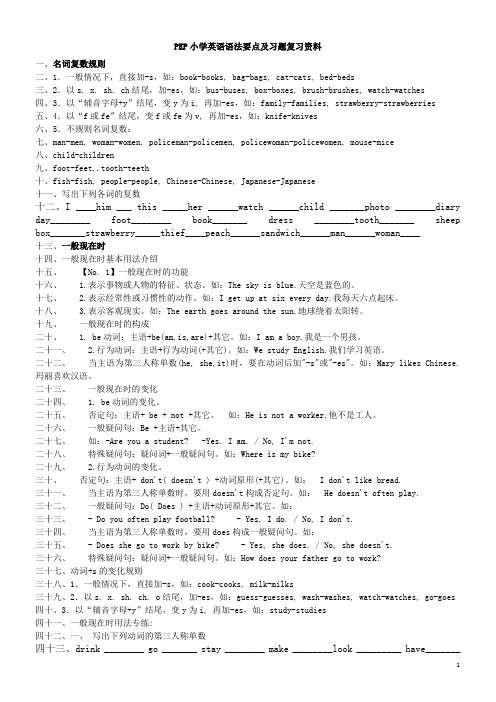
PEP小学英语语法要点及习题复习资料一、名词复数规则二、1.一般情况下,直接加-s,如:book-books, bag-bags, cat-cats, bed-beds三、2.以s. x. sh. ch结尾,加-es,如:bus-buses, box-boxes, brush-brushes, watch-watches四、3.以“辅音字母+y”结尾,变y为i, 再加-es,如:family-families, strawberry-strawberries五、4.以“f或fe”结尾,变f或fe为v, 再加-es,如:knife-knives六、5.不规则名词复数:七、man-men, woman-women, policeman-policemen, policewoman-policewomen, mouse-mice八、child-children九、foot-feet,.tooth-teeth十、fish-fish, people-people, Chinese-Chinese, Japanese-Japanese十一、写出下列各词的复数十二、I ____him ___ this _____her ______watch ______child _______photo ________diary day________ foot________ book_______ dress ________tooth_______ sheep box_______strawberry_____thief____peach______sandwich______man______woman____十三、一般现在时十四、一般现在时基本用法介绍十五、【No. 1】一般现在时的功能十六、 1.表示事物或人物的特征、状态。
如:The sky is blue.天空是蓝色的。
十七、 2.表示经常性或习惯性的动作。
小学英语语法总复习要点汇总
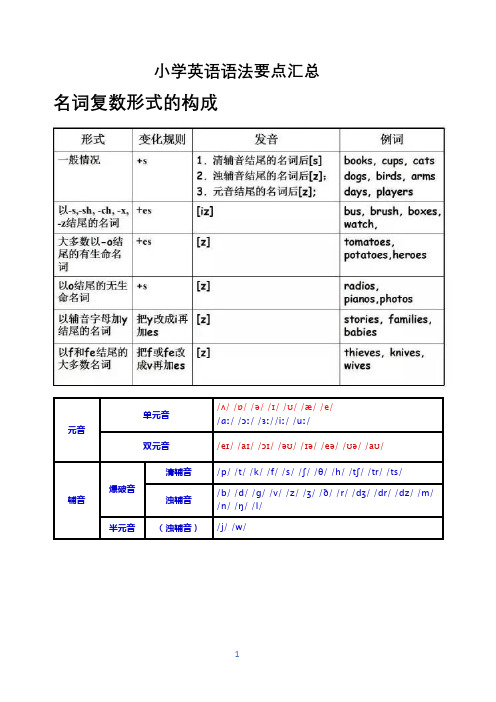
小学英语语法要点汇总名词复数形式的构成
冠词的用法
动词
动词的基本形式
第三人称单数变化规则
动词现在分词变化规则
动词过去式的变化规则
重读闭音节:以一个或几个辅音字母结尾、中间只有一个元音,该元音不发字母音,而发短元音,且该音节重读的
不规则动词见附表1
序数词
形容词比较级和最高级规则
不规则变化见附表二
附表1 - 不规则动词AAA型
AAB型
ABA型
ABB型
ABC型
两种变化形式
附表2 比较级和最高级的不规则形式1)少数单音节词前面加 more-, most- 构成比较级和最高级
2)不规则变化
3)下列形容词和副词的比较级和最高级有两种形式
4) 下列形容词和副词没有比较级和最高级(即表示”最高程度”或”绝对状态”的形容词和副词没有比较级和最高级)
empty , wrong , perfect , unique , extreme , excellent , favourite , true , right , correct , extremely ...
附表3 元音、辅音。
小学PEP英语总复习3-6年级英语语法总结(最全)
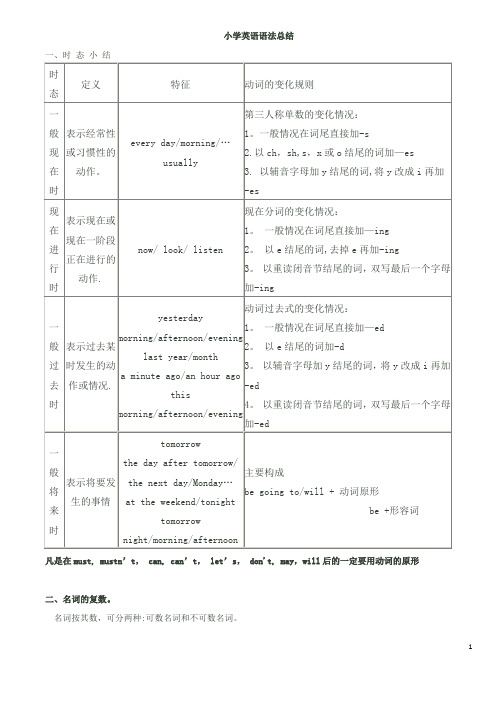
小学英语语法总结一、时态小结凡是在must, mustn’t,can, can’t,let’s, don't, may,will后的一定要用动词的原形二、名词的复数。
名词按其数,可分两种:可数名词和不可数名词。
可数名词的复数变化规则:1。
一般情况下,直接在词尾加-s,如:girl—girls, book-books, pen-pens2。
以s,x,sh,ch结尾的词,在词后加-es, 如:class—classes, box—boxes, match—matches,3. 以辅音字母+y结尾的,变y 为i 再加-es,如:city—cities, family—families, country— countries 4。
以f或fe结尾的,变f或fe为v再加-es,如:knife—knives, wife—wives, life—lives,5。
以o 结尾的加—es或—s, 如: radio-radios, tomato—tomatoes, potato—potatoes, zoo—zoos,photo-photos,6。
man—men, woman-women, foot—feet, child-children,三、形容词的比较级、最高级。
形容词有比较级与最高级之分,单音节词的变化规则:1。
一般情况下,直接在词尾加-er或—est, 如:small-smaller—smallest, short—shorter—shortest2. 以e结尾的,加-er或-est,如:large—larger—largest, nice—nicer—nicest。
3.以辅音字母+y结尾的,变y 为i 再加—er或-est, 如:busy—busier—busiest, heavy—heavier-heaviest。
4。
以重读闭音节,一个辅音字母结尾的,双写该字母,再加—er或—est,如:big—bigger—biggest,thin-thinner-thinnest。
小学语法总结全集英语(7篇)

1:“first”是序数词,与“the”相连,解释为第一。
2:像“first,term,world”作为词组出现时前面要加“the”。
3:“all”所有;后面的可数名词用复数形式,be动词用“are”。
4:“any”一些;用在否定句和一般疑问句中,与“some”同义。
“some”用在肯定句中。
5:there be+数词,采用“就近原则”。
6:a map of China 与 a map of the world 要牢记。
7:要用“on the wall”,不能用“in the wall”。
门、窗在墙上才能用“in the wall”。
8:can 后+动词原形。
9:play+the+乐器; play+球类;10:like的用法11:动词变动名词形式方法:A--直接在动词后面+ing形式(大多数)。
B--以不发音的“e”结尾的,要去掉e后再+ing,比如:dancing,making,riding。
C--重读be音节,末尾只有一个辅音,须双写末尾的字母后再+ing,如:running,swimmi ng,sitting,putting。
12:现在进行时的构成:be动词+动词ing形式。
标志:now、look、listen、its time to。
13:现在进行时的一般疑问句 /问--be动词+人称+时态(动词ing)答--Yes,he/She/it is/am/are. No,he/She/it isnt/arent/am not.14:用Are you...? Yes,I am/ we are. No,Im not/We arent.15: 动词后+人称宾格形式.16:一般现在时的构成:第三人称单数(三单)。
要注意:后面的动词+s或es。
特例:have→has do→dose go→goes; 标志:often,usually。
17:有些名词变动词时要变形式,例如:teacher→teach;driver→drive.1.一般现在时一般现在时态中,动词一般用原形。
小学英语语法大全(完整版)

小学英语语法大全(完整版)小学英语语法大全第一章:名词一、定义名词是用来表示人或事物名称的词语。
它可以表示具体的事物,也可以表示抽象的概念。
二、分类1.名词可以根据意义分为普通名词和专有名词。
例如,john是一个学生,其中student是普通名词,而john是专有名词。
普通名词前可以用不定冠词a/an,定冠词the或不加冠词,而专有名词前一般不加冠词。
另外,专有名词的首字母要大写。
2.普通名词又可以分为个体名词、集体名词、物质名词和抽象名词。
其中,个体名词和集体名词是可数名词,而物质名词和抽象名词是不可数名词。
3.专有名词专有名词是用来表示人名、地名、团体、机构、组织等的专有名词,多数情况下是独一无二的。
三、名词的数1、名词可以分为可数名词和不可数名词。
可数名词——可以数的名词不可数名词——数不清(没有复数形式)例如:drink(饮料)、milk(牛奶)、tea(茶)、water (水)、orange juice(橙汁)、coke(可乐)、coffee(咖啡)、porridge(粥)、food(食物)、rice(米饭)、bread(面包)、meat(肉类)、fish(鱼)、fruit(水果)、cake (蛋糕)、dumplings(饺子)2、可数名词可以与不定冠词a/an连用,有复数形式。
而不可数名词不能与不定冠词连用,也没有复数形式。
在修饰可数名词时,可以直接使用数词。
而在修饰不可数名词时,需要使用量词。
例如:many+可数名词复数;不可数名词用much/alittle+some/any/a lot of3、不可数名词的数量可以用以下两种方式表示:第一种方式是使用等量词,例如:some、much、a little、a lot of、a bit of、plenty of等。
注意,有些词既可以与可数名词复数连用,也可以与不可数名词连用,例如:plenty of、some、a lot of、lots of、等等。
- 1、下载文档前请自行甄别文档内容的完整性,平台不提供额外的编辑、内容补充、找答案等附加服务。
- 2、"仅部分预览"的文档,不可在线预览部分如存在完整性等问题,可反馈申请退款(可完整预览的文档不适用该条件!)。
- 3、如文档侵犯您的权益,请联系客服反馈,我们会尽快为您处理(人工客服工作时间:9:00-18:30)。
小学英语总复习资料(语法)
一.名词与量词
一.不可数名词:部分为液体类,气体类的物质单词(没有复数形式)
液体:tea coffee juice Coke milk water soup 气体: air gas
肉类: chicken(表“鸡肉”时为不可数名词,表“小鸡”时为可数名词)
fish (表“鱼肉”时为不可数名词,表“鱼”时为可数名词)总称: food fruit
其它: rain wind snow light
pizza pasta salad bread toast porridge rice chocolate ice-cream broccoli
grass(小草) money paper
二.名词复数形式:
1. +s
2. o(有生命), x, s, sh, ch +es
3. 辅音加y结尾,改y为i+es
4. 改fe 或f 为v+es
5. 单复数同形
fish sheep deer people family(作为“家人”解释时) Chinese Japanese
6. 特殊
man –men fireman–firemen policeman-policemen postman- postmen snowman-snowmen woman –women policewoman – policewomen
goose – geese foot –feet tooth – teeth ox- oxen child – children mouse-mice
三.名词的所有格
1.一般情况,在名词的末尾加’s (the boy’s bag )
2.以s结尾的复数名词末尾加’ ( the boys’ books )
3. 表示几个人共同拥有的东西,只在最后一个名字后加’s
如:Tom and Ben’s bedroom (汤姆与本共同拥有的卧室)
4. 分别拥有的东西就在每个名字后各自加’s
如:Tom’s bedroom and Ben’s bedroom (汤姆的卧室和本的卧室)5. 通常用“ …of + 名词”的方法来表示。
如: the cover of the book (书的封面)
注:姓氏的复数形式前面加the 表示“ …一家人”
如:the Whites (怀特一家人)
姓或名字后加所有格有时可以表示地点。
如:Let’ (我们去Jimmy 餐厅吃饭吧。
)
I’我准备去林老师家。
)
1。
